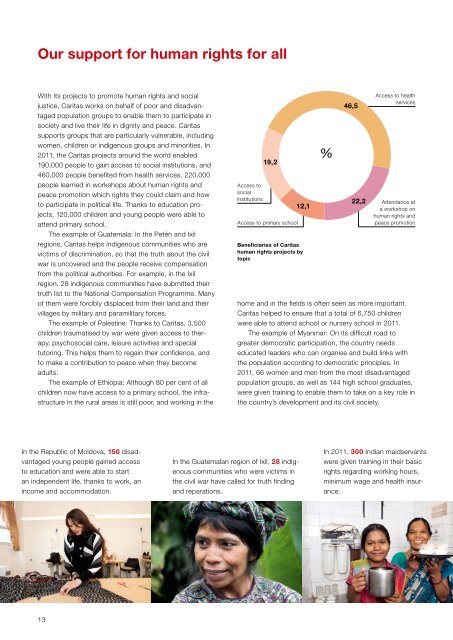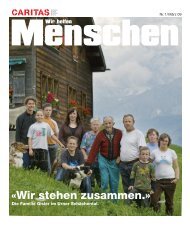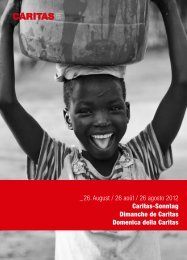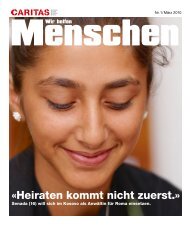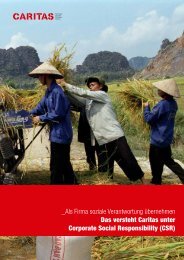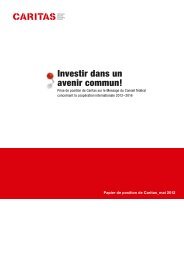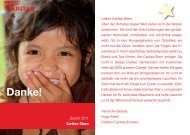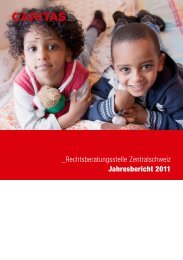Caritas Switzerland Annual Report of Activities - CARITAS - Schweiz
Caritas Switzerland Annual Report of Activities - CARITAS - Schweiz
Caritas Switzerland Annual Report of Activities - CARITAS - Schweiz
Create successful ePaper yourself
Turn your PDF publications into a flip-book with our unique Google optimized e-Paper software.
Our support for human rights for all<br />
With its projects to promote human rights and social<br />
justice, <strong>Caritas</strong> works on behalf <strong>of</strong> poor and disadvantaged<br />
population groups to enable them to participate in<br />
society and live their life in dignity and peace. <strong>Caritas</strong><br />
supports groups that are particularly vulnerable, including<br />
women, children or indigenous groups and minorities. In<br />
2011, the <strong>Caritas</strong> projects around the world enabled<br />
190,000 people to gain access to social institutions, and<br />
460,000 people benefited from health services. 220,000<br />
people learned in workshops about human rights and<br />
peace promotion which rights they could claim and how<br />
to participate in political life. Thanks to education projects,<br />
120,000 children and young people were able to<br />
attend primary school.<br />
The example <strong>of</strong> Guatemala: In the Petén and Ixil<br />
regions, <strong>Caritas</strong> helps indigenous communities who are<br />
victims <strong>of</strong> discrimination, so that the truth about the civil<br />
war is uncovered and the people receive compensation<br />
from the political authorities. For example, in the Ixil<br />
region, 28 indigenous communities have submitted their<br />
truth list to the National Compensation Programme. Many<br />
<strong>of</strong> them were forcibly displaced from their land and their<br />
villages by military and paramilitary forces.<br />
The example <strong>of</strong> Palestine: Thanks to <strong>Caritas</strong>, 3,500<br />
children traumatised by war were given access to therapy,<br />
psychosocial care, leisure activities and special<br />
tutoring. This helps them to regain their confidence, and<br />
to make a contribution to peace when they become<br />
adults.<br />
The example <strong>of</strong> Ethiopia: Although 80 per cent <strong>of</strong> all<br />
children now have access to a primary school, the infrastructure<br />
in the rural areas is still poor, and working in the<br />
In the Republic <strong>of</strong> Moldova, 150 disadvantaged<br />
young people gained access<br />
to education and were able to start<br />
an independent life, thanks to work, an<br />
income and accommodation.<br />
13<br />
Access to<br />
social<br />
institutions<br />
19,2<br />
Access to primary school<br />
In the Guatemalan region <strong>of</strong> Ixil, 28 indigenous<br />
communities who were victims in<br />
the civil war have called for truth finding<br />
and reparations.<br />
12,1<br />
Beneficiaries <strong>of</strong> <strong>Caritas</strong><br />
human rights projects by<br />
topic<br />
%<br />
46,5<br />
22,2<br />
Access to health<br />
services<br />
Attendance at<br />
a workshop on<br />
human rights and<br />
peace promotion<br />
home and in the fields is <strong>of</strong>ten seen as more important.<br />
<strong>Caritas</strong> helped to ensure that a total <strong>of</strong> 6,750 children<br />
were able to attend school or nursery school in 2011.<br />
The example <strong>of</strong> Myanmar: On its difficult road to<br />
greater democratic participation, the country needs<br />
educated leaders who can organise and build links with<br />
the population according to democratic principles. In<br />
2011, 66 women and men from the most disadvantaged<br />
population groups, as well as 144 high school graduates,<br />
were given training to enable them to take on a key role in<br />
the country’s development and its civil society.<br />
In 2011, 300 Indian maidservants<br />
were given training in their basic<br />
rights regarding working hours,<br />
minimum wage and health insurance.


